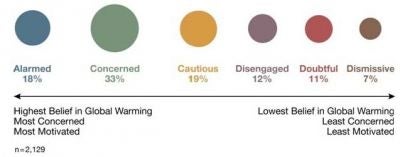People are greener when it comes to health

Researchers at George Mason University's Center for Climate Change Communication (4C) in the US state of Virginia found that environmental woes are much more interesting when linked to a public or personal health issue, according to an announcement by the university on July 19.
The new study was published in the June online edition of the peer-reviewed journal BioMed Central Public Health.
It details how Americans can be divided into six distinct groups, "the Alarmed (18% of the adult population), the Concerned (33%), the Cautious (19%), the Disengaged (12%), the Doubtful (11%), and the Dismissive (7%)" with respect to their "beliefs, behaviors and policy preferences about global warming." 4C defines these people as "Global Warming's Six Americas."
"Post-hoc analysis showed that five of the six segments responded more positively to information about the health benefits associated with mitigation-related policy actions than to information about the health risks of climate change."
Edward Maibach, the director of 4C, explained, "Re-defining climate change in public health terms should help people make [a] connection to already familiar problems such as asthma, allergies and infectious diseases;" additionally it shifts "the visualization of the issue away from remote Arctic regions and distant peoples and animals.
"The public health perspective offers a vision of a better, healthier future - not just a vision of an environmental disaster averted."
However the authors advised staying clear of specific campaigns that may "trigger counter-arguments and negative reactions," as is the case with the movement to ‘eat less meat to save the planet.'
Full study, "Reframing climate change as a public health issue: an exploratory study of public reactions": http://www.biomedcentral.com/qc/1471-2458/10/299#IDAATPUAB
Join our commenting forum
Join thought-provoking conversations, follow other Independent readers and see their replies
Comments
Bookmark popover
Removed from bookmarks